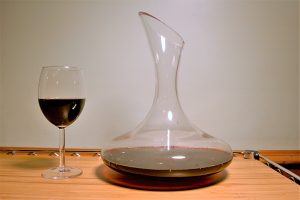Wine has a love-hate relationship to oxygen. Not enough oxygen when it is in the winery and wine can be reductive—engendering volatile sulfur compounds. Burnt match and rotten eggs are common odor descriptors. Too much oxygen and the wine tastes “tired” and eventually turns to vinegar.
When wine lives in the Goldilocks zone—not too much, not too little oxygen—everything is just right.
Oxygen begins to affect wine as soon as the bottle is opened. At first this is a good thing, helping release suppressed aromas and flavors. It is why allowing wine to “breathe” either in your glass or in a decanter or aerator can be a good thing.
At first, almost all wine can benefit—or at least not be harmed—by the initial exposure to oxygen. But the clock is ticking. As days pass after opening, wine becomes less enjoyable. There are devices and storage methods to slow the decline, but as long as the wine is exposed to oxygen decline is inevitable.
Wine spoiled by too much oxygen exposure can be identified by sight, smell, and taste. Spoiled reds take on a rusty brown color; spoiled whites turn yellow, gold, or dark. Spoiled wine will have aromas of fruit replaced with bitter, even acetone smells. If the nose gives you pause, pour the wine down the drain instead of into your glass.
If you aren’t sure about spoilage, you can always taste the wine. Spoiled wine will not harm you, but it also will not bring joy. It will taste unbalanced. It will have nuttier notes and subdued fruit flavors. Higher alcohol wines will taste more alcoholic.
Different wines have different after-opening drinkability. Wines with lower tannins—grenache, pinot noir, gamay, for example—spoil faster. Wines with higher sugars—riesling—last longer. Wines with high tannins, acidity, and sulfites last longer. Oxidized wines—madeira, Oloroso sherry, port—will last the longest after opening because oxidation is part of the process of creating the wine.
Box wine can last a month after opening, particularly if stored in your refrigerator. There are storage methods that replace oxygen in the bottle with inert gasses—Coravin, for instance—that extend the life of a bottle for years.
As with almost all things with wine, if the wine tastes good to you days or weeks after opening, then enjoy.
Last round: When I see names of lovers carved into a tree, I don’t find it romantic. I find it weird people take knives with them on dates. Wine time.


